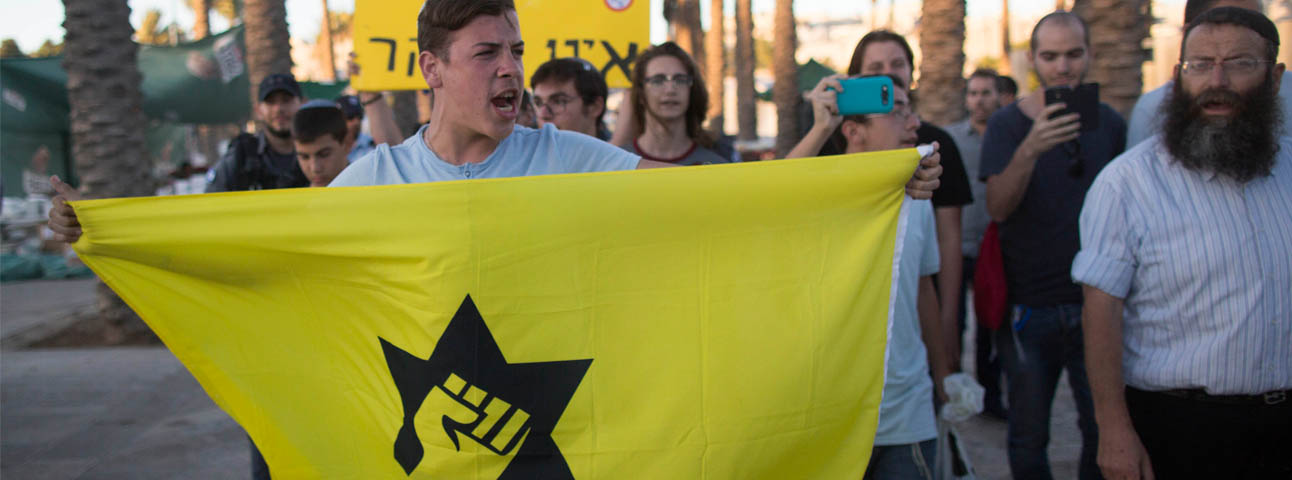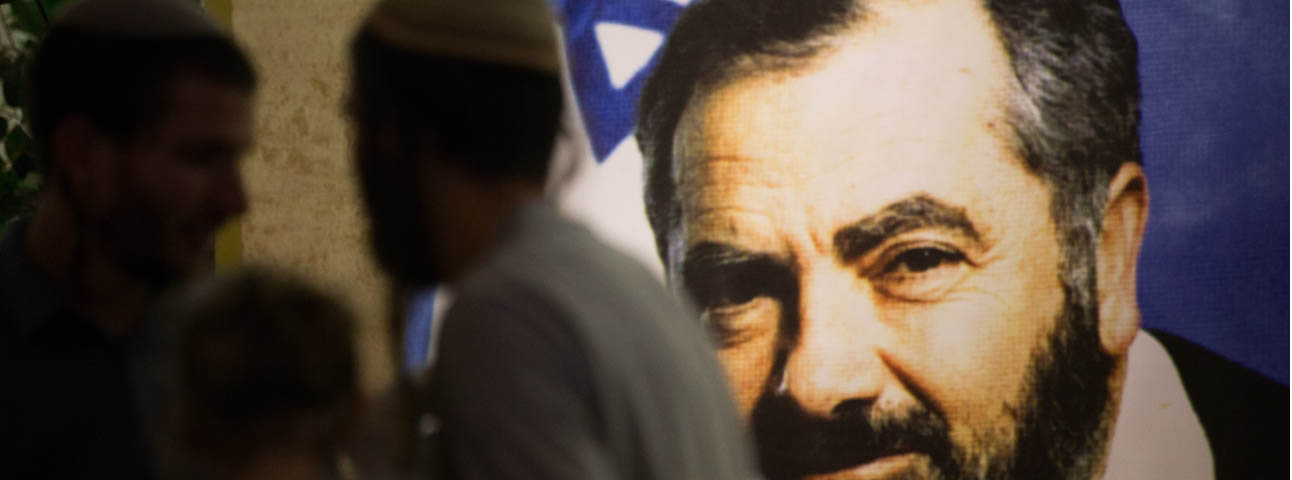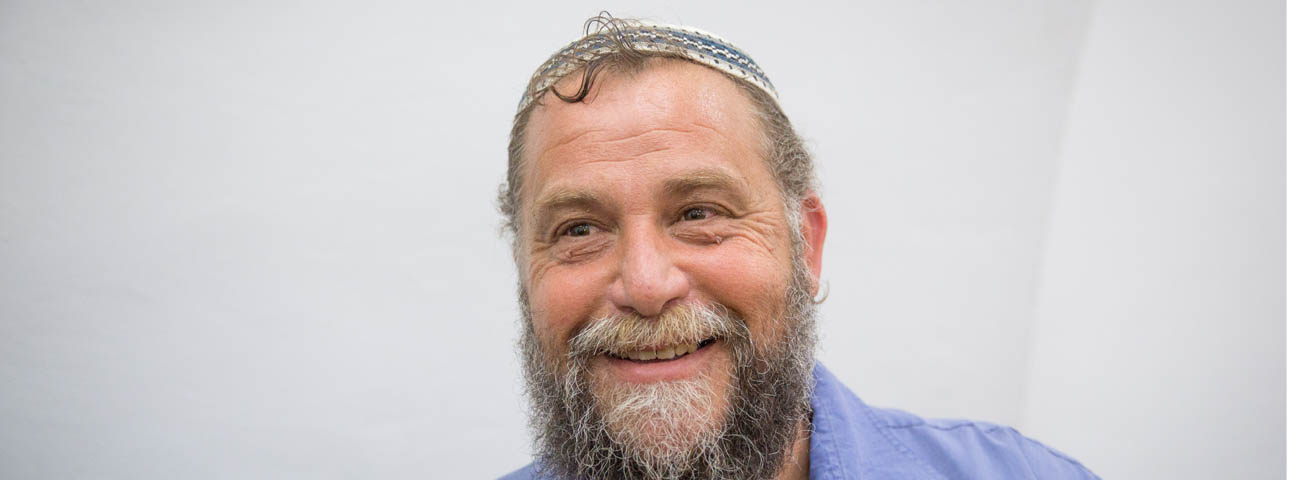Israel's Alt-Right is Now Mainstream - Are Lawmakers Doing Enough to Stop It?
Like Kahane, Gopstein’s ultimate dream is an Israel that operates according to Jewish law, or Halacha, where the only Arabs who live there are those loyal to a Jewish theocracy.

On November 5, 1990, at a Marriott Hotel on Manhattan’s East Side, Rabbi Meir Kahane had just taken his seat at a Zionist conference when El Sayyid Nosair, a 34-year-old Egyptian-American, shot him in the neck. Hours later, the Brooklyn-born rabbi—known as the most racist politician in Israeli history—was pronounced dead.

Most Israelis didn’t mourn. Two years before, the Israeli government had banned his political party, Kach, for its anti-Arab platform. Kahane had called for the forced expulsion of the millions of Arabs living in Israel, whom he often referred to as “dogs.” As the Israeli writer Yossi Klein Halevi puts it, “Kahane turned his political agenda into a kind of Jewish jihad with an explicitly religious, apocalyptic message.”
Yet 27 years after Kahane’s murder, on another November evening, hundreds of Israelis gathered in West Jerusalem to commemorate the anniversary of his death. It was one of 25 such events held throughout Israel that week. At the podium, Jewish extremists took turns praising the rabbi, calling him a righteous prophet whose politics were ahead of his time.Among those in attendance: Kahane’s prodigy and successor, Ben Zion “Bentzi” Gopstein. In 2005, he established Lehava, a nonprofit whose Hebrew name translates to “preventing assimilation in the Holy Land.” Gopstein’s group sends patrols of young men to “defend” Jewish women from Arabs. It also runs a hotline for people to report Jews having interfaith relationships, or renting or selling apartments to Israeli Arabs. Lehava has grown into the largest radical right-wing organization in Israel, with chapters in every city and more than 10,000 registered members—most of them young adults and teenagers. The group spreads its message and recruits members in schools, city streets and community centers.
Though Gopstein operates under the guise of fighting assimilation—a cause familiar to many American Jews—his critics argue that mission is just a front. Lehava, they say, is as dangerous as Kach. And like Kahane before him, Gopstein is rallying people around the goal of expelling Palestinians from Israel and the West Bank.
But unlike Kahane’s views, which stood on the margins of Israeli society, Gopstein’s perspective has become mainstream—a shift, analysts say, that reflects Israelis’ dwindling faith in the prospect of peace with the Palestinians.
Critics argue that Israeli lawmakers have also enabled Lehava, even as they’ve demonized left-leaning human rights groups. Yet Israeli authorities say there is little they can do to stop Gopstein—that he is protected by free speech, and because his group is a nongovernmental organization, it has avoided the legal restrictions placed on Kahane’s political party. “Lehava is doing this very smartly,” says Tehilla Shwartz-Altshuler, a law professor at Hebrew University and a senior fellow at the Israel Democracy Institute, a Jerusalem-based think tank.
But the group’s critics aren’t giving up. Last fall, the state attorney’s office announced its intention to indict Gopstein on charges of incitement to violence, racism and terrorism, along with obstruction of justice, pending a prehearing. (The charges all relate to statements he’s made in recent years. Among them: that Palestinian men who flirt with Jewish women deserve to be beaten.) Gopstein is still awaiting his prehearing. In the meantime, to the dismay of his distractors, he is a free man, with a large and growing following.
"The Israeli army, the Shin Bet and Mossad, they know how to deal with Muslim terror,” says Gadi Gvaryahu, the chairman of Tag Meir, one of the organizations battling Lehava. “Yet the state of Israel doesn’t know how to deal with right-wing extremists. People like Bentzi Gopstein are more dangerous to Israel than Muslim terror.”

‘You Can’t Coexist With Cancer’
Several months ago, I met Gopstein in the lobby of a Jerusalem hotel, and he appeared giddy. A Jewish teenager had just left her Arab lover. Gopstein had been calling her for months, urging her to do so. Now, she finally had—because she was pregnant with his child. Gopstein says this was important because now the baby would be raised Jewish instead of Muslim.
Since founding Lehava, he says, he has “rescued” at least 1,000 girls like her. And in Jerusalem, Lehava activists are known for harassing—and sometimes beating—Palestinian men. Gopstein’s work has sometimes gotten him into trouble. Weeks earlier, police detained him, along with 14 members of Lehava, for threatening Arabs who were dating Jewish women. “Every time they arrest me, more people join my cause,” he says, smiling. In 2016, he was questioned by police after calling Christians bloodsucking vampires who should be expelled from the country. In 2014, he was detained after Lehava members set fire to a joint Jewish and Arab school in Jerusalem. The group also sprayed graffiti on the school’s walls. "You can't coexist with cancer,” it read.
In each of those cases, Gopstein was released the same day. He has never been indicted either. The last time Israeli authorities put him behind bars was in 1994, when the government banned Kahane’s political party. (The ban was in response to a massacre committed by another Kahane prodigy, Baruch Goldstein, who opened fire in Hebron’s Cave of the Patriarchs, killing 29 Muslim worshippers and wounding 125 others.)
The Justice Ministry refused to comment on Gopstein’s case while the investigation is underway. “He’s always been found not guilty because they have nothing,” says Gopstein’s attorney, Itamar Ben Gvir. “They don’t even have one example of Bentzi telling people to commit an attack. Praising Baruch Goldstein [which Gopstein has done] isn’t illegal. You can think it’s an awful thing to say. You can think it’s a wonderful thing to say. That’s a democracy.”
The courts are very careful when it comes to pressing criminal charges against people over speech, and when it comes to people like Gopstein, the Supreme Court is more afraid of government censorship than of what Lehava is saying to Israeli societyTehilla Shwartz Altshuler
Yet Gopstein’s actions, critics say, speak to his real agenda: anti-Palestinian hatred. “Gopstein wants us to believe that he’s just worried about the future of the Jewish religion, but he’s not,” says Gvaryahu. “We never heard him fight against assimilation in the United States, and here the intermarriage rate is really insignificant.” Indeed, just 2 percent of Jewish Israelis have a non-Jewish spouse, compared with 44 percent in the U.S.
The Shin Bet, Israel’s internal security agency, has a unit for Jewish terrorism, but a spokesman tells me it’s the police’s responsibility to deal with Lehava. Israel Police spokesman Micky Rosenfeld says the local cops have been trying to prevent and respond to violence committed by Gopstein’s activists, but there is only so much they can do. “Police operations take place all year round in connection with Lehava,” Rosenfeld says, speaking in October, shortly after Gopstein’s latest detention. “Those suspects were released after significant evidence was presented against them. The police recommendation was to continue holding them. But at the end of the day, the decision made by the court, unfortunately, is what it is.”
Gopstein’s critics argue that Israel should treat him the same way it treats his Palestinian counterparts. But Israel has a long history of handling Jewish radicals differently. In 1984, the authorities determined that a Jewish militant group was plotting to blow up the Dome of the Rock in Jerusalem, one of Islam’s holiest shrines. A court convicted 25 Jewish settlers of waging an underground campaign of violence against Arabs in the West Bank and the Golan Heights. All were soon released, except for three who were convicted of murder and sentenced to life in prison—but they wound up serving less than seven years. Jewish settlers cheered their return home. And they weren’t the only ones. Many of the Jewish extremists arrested in the 1980s and 1990s quickly re-entered Israeli society, becoming settlement leaders and political activists.
More recently, in 2005, a Jewish extremist went to prison for stabbing marchers at Jerusalem’s gay pride parade. In 2015, three weeks after his release, he stabbed a 16-year-old Israeli girl to death at the same event. Gopstein and Lehava activists protested against that parade, calling it an “abomination,” and have continued to protest it every year since. “Israel should put much more into fighting Bentzi,” argues Gvaryahu. “It’s about time.”
Yet Gopstein’s supporters believe the state has treated him too harshly, protecting free speech for Arabs and not for Jews. “What they’re accusing Bentzi of, you can say the same about the Arabs,” says Ben Gvir, Gopstein’s attorney. “Thousands of Arabs praise Palestinian terrorists, and no one is indicting them.”
Human rights groups call that argument absurd. Israel has imprisoned 470 Palestinians for social media incitement since 2015. Among them: the Arab-Israeli poet Dareen Tatour, who was arrested in October 2015, jailed for three months and remains under house arrest for publishing a poem and two Facebook status updates, which her attorneys claim Israeli authorities translated improperly. Tatour was indicted for incitement to violence and support of a terrorist organization.
Some, such as Shwartz-Altshuler, say this disparity is not caused by racism or bias but by outcomes: Because Arabs commit more terrorist attacks against Jews than the other way around, they’re more likely to be convicted of incitement. “The fear is that those incitements on Facebook in Arabic will make someone who sees them take a knife and go stab someone,” says the law professor. “On the other hand, Israeli authorities are well aware of the dangers that movements like Lehava pose to Israeli society”—and yet perhaps less concerned they’ll lead to deadly violence.
But are they doing enough to contain that danger? Jewish extremists have committed some of the most horrific crimes in Israeli history—from Goldstein’s massacre to the murder of Yitzhak Rabin, the prime minister who championed peace with the Palestinians. His assassination—by Yigal Amir, a Jewish radical—came after months of right-wing Jewish incitement against Rabin and his peace efforts. It remains the only assassination of an Israeli head of state in the country’s history.“
The fact that Kach was considered a terror organization means that any group stemming from it is essentially also a terrorist group,” argues Fady Khoury, an attorney at Adalah, the Legal Center for Arab Minority Rights in Israel.
Unlike the U.S., Israel has no constitution—and so no fundamental right to free speech. Instead, Israeli courts protect this freedom on a case-by-case basis. “The courts are very careful when it comes to pressing criminal charges against people over speech,” says Shwartz-Altshuler. And when it comes to people like Gopstein, the professor claims, “the Supreme Court is more afraid of government censorship than of what Lehava is saying to Israeli society.”
Ultimately, Israel may not have the power to stop Gopstein, since he is not a politician and has not committed any known attacks. “Kahane was not banned from speaking outside the Knesset,” notes Halevi, a senior fellow at the Shalom Hartman Institute and a former member of Kahane’s Jewish Defense League in New York. “A democracy, especially a democracy under siege from constant war and terror, needs to walk a fine line between allowing freedom of speech and ensuring that freedom of speech doesn’t result in violence. Lehava needs to be reined in when it crosses the line. And it has repeatedly crossed the line. At the same time, Lehava’s ideas cannot be banned.

Hard-Right Turn
In recent years, there have been political efforts to derail Gopstein, but they have largely failed. In 2015, former Israeli Defense Minister Moshe Ya'alon tried to designate Lehava as a terrorist group. A year later, he was forced out of the government and replaced by Avigdor Lieberman, a hawkish figure who once said that disloyal Arab citizens of Israel should be beheaded. “Extremist and dangerous forces, Ya’alon warned as he resigned, “have taken over Israel.”
Since Kahane’s days, Israel has moved far to the right. Today, according to a recent Pew Research Center poll, 48 percent of Jewish Israelis believe that Israel should expel its Arab citizens, who constitute nearly 20 percent of its population. Twenty years ago, 32 percent of Israelis considered themselves left-wing. Today, that figure is 19 percent, according to the IDI, the Jerusalem-based think tank. A November report by IDI found that 51.5 percent of Jewish Israelis feel that to preserve Israel's Jewish identity, Arabs and Jews should live separately, and 58 percent say that people who aren’t willing to say Israel is the nation-state of the Jewish people should have their citizenship revoked. Today, the government is even considering legislation that some observers say would make Israel’s status as a Jewish-majority state more important than its democratic values. This would be the first step, some observers claim, toward establishing the country Kahane envisioned.
Part of this hard-right shift, analysts say, has to do with the trauma of the violent second intifada, or uprising. Between 2000 and 2005, Israelis lived through a long series of almost daily suicide bombings in cities such as Jerusalem and Tel Aviv. It also reflects a loss of faith in the peace process. After Israel and the Palestinians signed the historic Oslo Accords in 1993, many had hoped the bloody, decades-long conflict would end. Instead, both sides are locked in a stalemate, and Israel has fought two wars with Hamas, the Islamist group that controls Gaza.
Gopstein says he’s merely expressing what most Israelis believe, which he insists isn’t racist. "Arabs who accept this state as a Jewish state can stay here. Those who don’t need to leave,” he tells me. “We don’t want to kill Arabs just because they’re Arabs. That’s racism. But Arabs who want to take our country from us? God gave Israel to the Jewish people, and people who don’t believe that shouldn’t be here. ”A resident of Kiryat Arba, the radical Jewish settlement inside the mostly Palestinian city of Hebron, Gopstein rejects the claim that he encourages or even inspires his followers to commit violence. “I’m against doing illegal things,” he insists. “The solution is not to burn the Arab-Jewish schools; the solution is to close them.” And yet he doesn’t condemn those illegal acts and even defends Goldstein’s Hebron massacre. “I don’t think that what Goldstein did was bad. I just wouldn’t do it myself. He saw Arabs killing his friends and family, and he saw them being happy about their deaths. So he took revenge.”
Gopstein claims to have no interest in following Kahane’s footsteps into politics. Yet his influence is felt, even without him serving in the Israeli parliament. Members of the country’s ruling party have invited him multiple times to speak in the Knesset. The Jerusalem municipality allowed Lehava to post billboards in November, advertising the Kahane memorial and thanking Gopstein for his work. In 2015, the Education Ministry banned an award-winning novel about an Arab-Jewish romance from the national high school curriculum, after Gopstein launched a campaign against it.
Like Kahane, Gopstein’s ultimate dream is an Israel that operates according to Jewish law, or Halacha, where the only Arabs who live there are those loyal to a Jewish theocracy. “At this rate,” he says of Palestinian citizens of Israel, “it’s either us or them.”
The article was published in Newsweek
